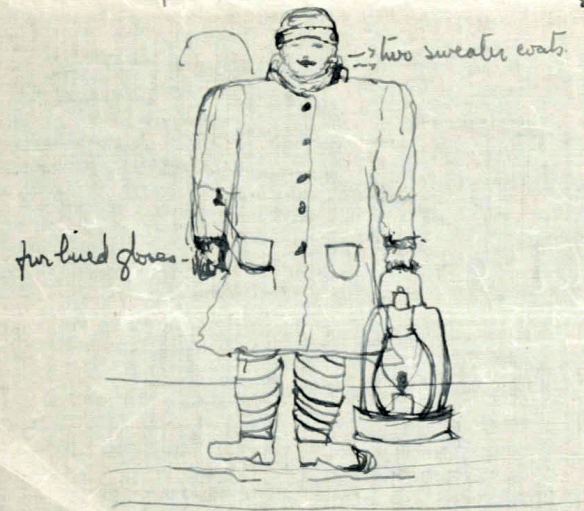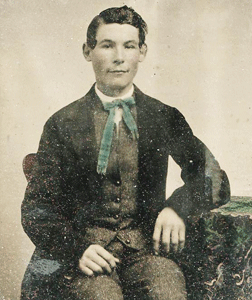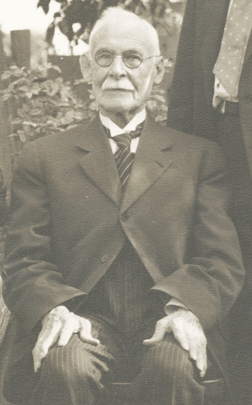
The censor has approved Ruby’s letter in upper left corner
Ruby is probably now in Salonika, Greece – the censor won’t allow her to tell her sister precisely where she is.
An Arctic chill along with constant mist has descended. Improvising warm clothing while not appearing to be immodest becomes a bit of an obsession, and not just a challenge. It was here that the seeds were planted for the pleurisy, pneumonia, and finally tuberculosis that felled her in 1918. In that year Ruby was invalided back home to recover in a sanatorium.
Ruby sends greetings to her sisters-in-law Florence Johnstone Peterkin and Minnie Slater Peterkin.
No. 4 Canadian General Hosp
British Forces in Greece
[Nov. 27, 1915]
Dear Rene —
I received your letter of Nov. 9 – yesterday and it is so funny to hear every one say they are glad we are settled in Alexandria when we have never been near that place. The officers and men were there for some days on their way here but unfortunately we were not with them. We spent that time in Malta instead at that beautiful spot St. George’s.
So you are not going to the Soo after all. It is too bad in a good many ways, but as you say it wouldn’t be much fun alone. Weren’t they pigs not to take Mildred too. But why didn’t you and Theresa go?
Dear me, I have so much I want to say I don’t know where to start. I got your letter about not going to the Soo a few days ago. Did you get my Round Robin? I told Hugh to send it right on to you. And now you want me to describe the climate and natives! Well, to begin with the climate. We came right from Malta where the sun glared on the white stone all day and we nearly scorched in the middle of the day – everyone wearing sun helmets and goggles – to Arctic weather here. I might repeat, incidentally that we had a very rough passage getting here. Well, I have come thro as well as anyone but it kind of put us all on the brink. It wasn’t so fearfully cold the day we arrived. I went on night duty the second night after we arrived and that was when it began to get cold. I have told you all about that in my Round Robin. It isn’t nearly as cold now and I have discarded layer after layer of clothing till all the extras I am wearing are two sweater coats under my rain coat. And I am wearing puttees – the regular soldiers’ ones you know that you wind around and around. You see, I objected to showing the whole of my socks to the wide world and these are the grandest things and the warmest. I expect I shall wear them all the rest of my natural life. I am so glad we were particular about getting our skirts to hang evenly when they were made, for if not, they would never have been even now when we hike a foot and a half of them up under our belts. As it is there isn’t more than six inches difference between the back and front at the bottom. However, the mud is not so bad just at present and I can wear boots and rubbers. The rubber boots were giving me chilblains. We have not seen the sun for about five days. There is a constant mist descending that is not rain, but so near it you can hardly tell the difference.
So much for the weather and I herewith append a sketch of yours truly ready to start on duty. I told you I had cut off my rain coat above my boot tops. I don’t know whether I told you we had been presented with men’s overcoats from the Red Cross supplies, because our great coats were getting worn out. They are shorter even than the rain coat. Personally I don’t put mine on till after midnight and change back to my rain coat at day light.
Now as we are not allowed out of the camp at anytime, the only natives we see are a flock of goats quartered out behind the camp with a lone shepherd or two and a few mules that pass on the road with their drivers. Then we have a squad of about fifty Greeks working round the hospital, as garbage men &c. They wear the most non descript garments imaginable, some have goat-skins draped around them and nearly all have high boots and baggy trousers. When we want to go for a walk for a mile or two we get up an escort from among the officers. Col. Chambers is the M.O. for sick sisters, so when he prescribes a walk for any of them he has to detail one or more officers to accompany them.
I think I had better get this finished up or I’ll never get it away, for I am now writing at 3 a.m. several days later. It is impossible almost to write letters here. I am not quite so busy to-night, but this is the first night I have had any time to write. I think you will have to share this with Minnie for I don’t believe I can write her just yet. It isn’t that I forget to write to you all, but I simply haven’t the energy when I get off duty in the morning to do any thing but tumble in to bed. There is so much walking to do between the wards.
We expect to be off night duty in another week and are wondering if they will take us off for Xmas or not. I got a little box from Mossie the other day with some handkerchiefs and chocolate. The girls are getting their boxes all right and I wish I had let you send me some things but it is too late now for the present and with things as they are in this peaceful time one never knows when we may be moving at short notice. I’ll let you know tho’ whenever I think it will be safe to send anything for I want heaps of things. We cannot buy a single, solitary thing except thro’ the quarter master who goes to town every day. What wouldn’t we give for a day on Yonge St.?
I must close this or I’ll never get it away. I got a letter from Florie last night and was very glad to hear from them. Give them all my love, but I don’t know when I’ll ever get time to write. However tell every one to keep on writing to me and they will be doing that much for their country. Love to Minnie and Ern and yourself. Don’t work too hard. Did I tell you I think your blue dress is sweet!
Yours
Ruby

 Back in the summer of 1953 I visited Scotland for the first time. On my own I joined a Thomas Cook bus tour and was thrilled to learn that we would spend a night at Huntly Castle Hotel which we were told had been built in the 1700s by George, Duke of Gordon, of stones retrieved from the old ruined Castle nearby. And lucky me I had the chance to spend the night in a murdered Duchess’ four-poster canopy bed.
Back in the summer of 1953 I visited Scotland for the first time. On my own I joined a Thomas Cook bus tour and was thrilled to learn that we would spend a night at Huntly Castle Hotel which we were told had been built in the 1700s by George, Duke of Gordon, of stones retrieved from the old ruined Castle nearby. And lucky me I had the chance to spend the night in a murdered Duchess’ four-poster canopy bed.
